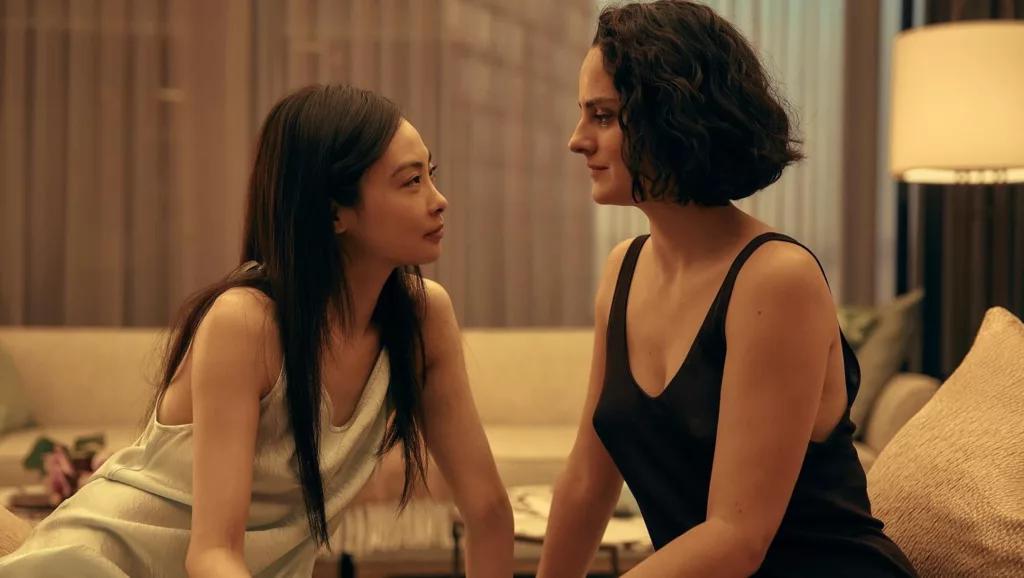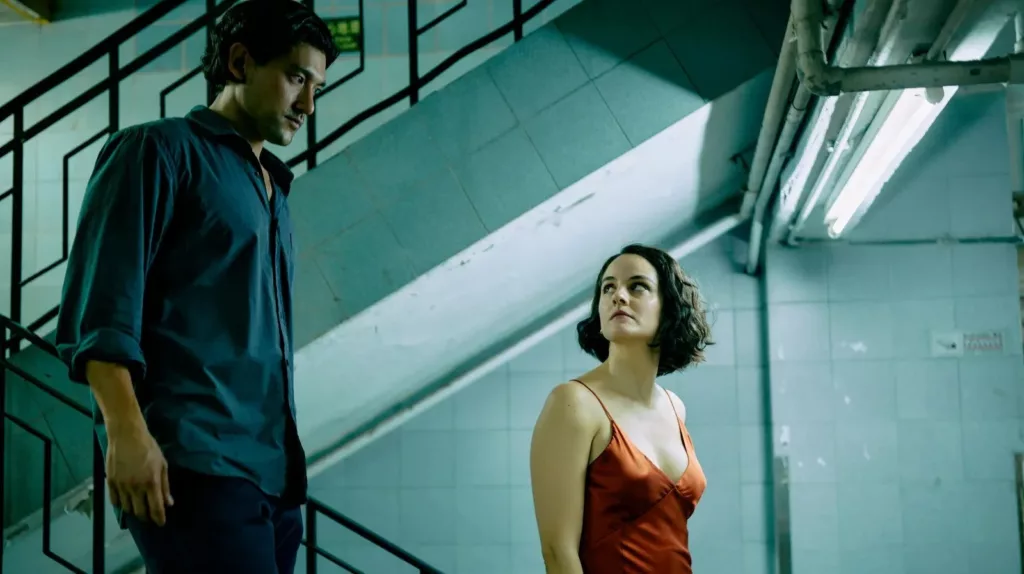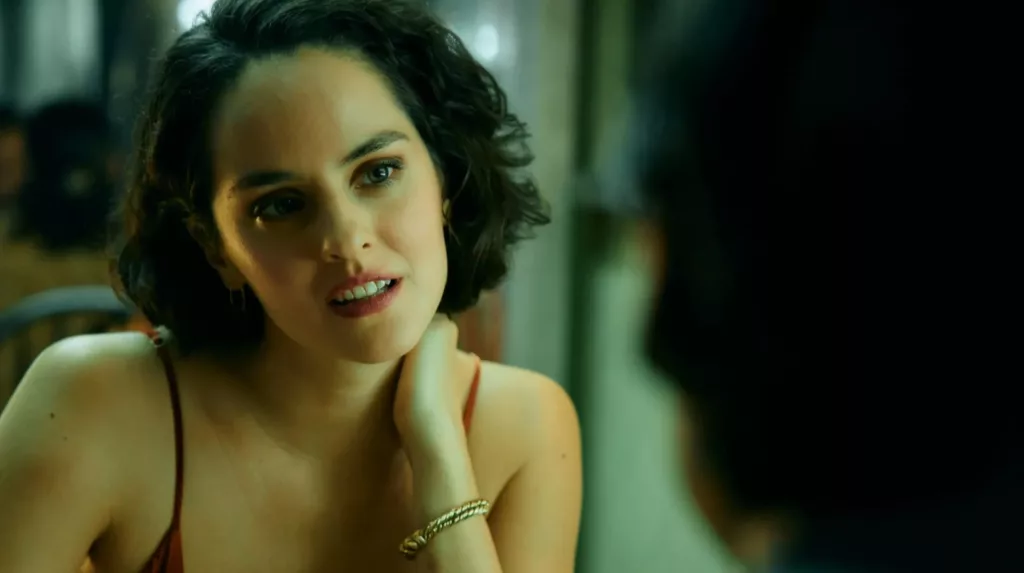The 1974 romantic drama Emmanuelle caused quite a stir upon its release. Based on an erotic novel, the film featured explicit love scenes that were virtually unprecedented for mainstream cinema at the time. Starring a young Sylvia Kristel, Emmanuelle told the sexually liberated story of a woman discovering intimacy in Thailand alongside her husband. It proved a massive box office hit and cultural talking point, ostensibly helping to normalize depiction of female sexuality on screen.
Fast forward several decades, and French filmmaker Audrey Diwan took on reviving the property. Fresh off her acclaimed drama Happening about the 1960s abortion battle, Diwan set out to bring Emmanuelle into the modern era. This new version casts Noémie Merlant as the title character, now recast as a quality inspector for luxury hotels. Her latest assignment brings her to Hong Kong, where she finds herself drawn to both women and men.
With its stylish visuals and positioning Emmanuelle as an independent career woman, Diwan’s remake aims to explore female desire free from the male gaze or patriarchal constraints. However, the end result proves disappointingly hollow. Merlant lacks chemistry with her brief lovers, coming across detached rather than liberated. The gorgeous hotel backdrops overshadow thin characterizations. Striving for female empowerment, Emmanuelle instead often feels performatively produced for hypothetical viewers, never conveying authentic experiences or genuine emotional depth that could resonate. While Diwan’s intentions were well-meaning, her remake regrettably fails to advance understandings of its provocative topic.
Rosefield Palace Rendezvous
The story begins aboard a flight to Hong Kong, where hotel inspector Emmanuelle has an unfulfilling rendezvous in the toilet with a stranger. She seems disengaged, highlighting her detachment that continues throughout the film. Arriving at her destination, Emmanuelle checks into the luxurious Rosefield Palace hotel to complete her work assessment.
As part of her evaluation, Emmanuelle explores different areas of the hotel. She engages in an unemotional threesome with another couple in one of the suites. Emmanuelle also connects with the escort Zelda, who frequents the hotel pool area. While their friendship develops, even this intimacy leaves Emmanuelle seeming unfulfilled.
During her time at the Rosefield, Emmanuelle becomes interested in the mysterious guest, Kei. However, he rejects her advances, leaving her intrigued but dissatisfied. Elsewhere, Emmanuelle halfheartedly attempts to find faults to get the hotel’s manager Margot fired, though this proves an uneventful subplot.
As Emmanuelle remains on her solitary journey, disconnected from those around her, she comes to realize the relationships bring her no pleasure. However, her intrigue in Kei persists. Later, she seeks him out at a hidden gambling location and discovers he builds dams for work. Despite opening up to Emmanuelle slightly, Kei still maintains an emotional distance.
It’s not until Emmanuelle engages in solo intimacy with assistance from Kei that she discovers a type of connection giving her satisfaction. Even this revelation comes late in the film, as Emmanuelle spends much of the narrative listlessly navigating various fleeting encounters at the Rosefield Palace hotel and remaining uncertain of her own desires.
Peeling Back the Luxurious Veneer
Audrey Diwan recruits talented cinematographer Laurent Tangy to bring the opulent settings of Emmanuelle to life. Shot on location at Hong Kong’s lavish St. Regis hotel, Tangy creates vistas that could grace the pages of an architecture magazine. He lavishes as much attention on detailing gleaming marble floors and flowing silk drapes as Diwan does crafting the plot.
The sweeping shots of the Rosefield Palace’s lobby and suites establish an aura of luxury beyond most viewers’ wildest dreams. Tangy seamlessly transports the audience to the hotel’s sumptuous world. However, expansive descriptions of the accommodation’s extravagant amenities are prioritized over meaningful insights into the characters.
While undeniably pleasing to gaze upon, these polished exteriors fail to reveal deeper layers. The production design and lighting seem aimed more at lifestyle advertising than illuminating the narrative. A distracting sheen prevents examining pertinent themes below the surface.
In contrast to the glossy corporate spectacle elsewhere, Tangy’s cinematography excels in Emmanuelle’s romantic encounters. He frames the erotic scenes with a delicate female eye, imbuing intimacy with sensuality over salaciousness. Through warm tones and careful composition, naked bodies appear more beautiful than shocking.
Yet even these moments feel restrained in a film centered on sexuality. While respecting boundaries of consent, bolder works like Portrait of a Lady on Fire portray passion’s raw, uncontrived nature. Emmanuelle’s protagonist remains strangely disconnected regardless of partner, hinting at a missing authentic essence.
As sumptuous as the visuals remain, peeling back their superficial veneer exposes a deficit of meaningful substance underneath. While appearance draws viewers in, only distinguished characters and compelling plotlines keep them invested. On these fronts, Emmanuelle leaves its sophisticate setting sadly underutilized.
A Dispassionate Liberation
Reviving Emmanuelle allows Diwan to explore shifting female sexuality. On paper, empowering Emmanuelle through career and pleasure outside relationships sounds progressive. Yet constant detachment from partners renders her journey dispassionate.
While boldly placing desire centerstage, Emmanuelle engages in acts seeming performative versus genuinely fulfilling her own pleasure. Whether group sex or solo play, she remains disengaged, distancing even private moments for consumption by others like hotel security.
Her pursuits feel rooted more in liberated gender politics than liberated personal feelings. Diwan understands the feminist importance of embracing desire, but execution misses the mark by not depicting desire’s raw, authentic human elements.
Audiences hoping to see sexuality from a woman’s viewpoint may feel let down. Contrast successful films like Portrait of a Lady on Fire, which sensitively capture intimacy’s emotional richness accessible to all genders. Their heroines feel fully-realized people, not just symbols.
Had Emmanuelle connected with partners in a viscerally engaging way, commentary on social control of women’s bodies could resonate more profoundly. As it stands, constant detachment renders superficial a premise with potential for deeper insight.
Ultimately, both protagonist and film remain strangely disconnected, undercutting the message of empowerment through genuine pleasure. While the importance of centering desire is clear, merit relies on conveying humanity, not just stylized imagery or idealized feminism.
Surface Depths
Emmanuelle teases many themes around sexuality and freedom but fails to excavate meaningful insights. Beyond surface symbolism, viewers understand little of what drives Emmanuelle or shapes her gradual “awakening.” She lacks authentic motivations and complexity that could resonate.
Kei, Zelda, and Margot receive even less dimensionality, coming across as archetypes before people. Kei’s emotional distance holds intrigue yet remains unplumbed. Zelda’s escort life story feels two-dimensional.
Stilted dialogue also denies characters interior lives. Exchanges sound inauthentic, detached from visceral human experiences. Characters recite platitudes, failing to engage each other on an emotional level.
Overall sparse characterization reduces all to mere set dressing within sumptuous visualscapes. Lavish hotel backdrops overshadow opportunities to probe identities’ nuanced intersections with gender, pleasure, and society.
Diwan grasps feminism’s importance but misses a chance for deeper resonance by not sculpting characters believably navigating these profound topics. Style overwhelms substance, prioritizing spectacle over illuminating complex human experiences in a meaningful way.
With richer developmental arcs granting motivational specificity, Emmanuelle and company could have probed their themes of sexuality and modern womanhood with more impact. Alas, they dwell too far on surfaces to penetrate depths.
A Superficial Reimagining
Where the 1974 Emmanuelle broke barriers with its substance blended beautifully with its titillating style, Diwan’s remake largely misses the deeper social commentary of the original.
While the plot borrows little more than character names and a basic premise, the first film balanced explicit scenes with social insight. It portrayed a woman embracing changing values yet highlighting the realities of female experience. Diwan’s Emmanuelle skims surfaces, exploring pleasure without penetrating profound themes.
Where eroticism and visual flair drove immense cultural impact in the 1970s, today’s empty aesthetics engage eyes but not minds. Lacking much revision beyond surface updates, it offers no fresh perspective on the subject to resonate in a modern context.
Partly due to loose inspiration and partly due to underdeveloped characters, the remake fails to tap potential for commentary on modern issues like #MeToo orfluid gender norms. Its protagonist remains an adistant, puzzling symbol lacking authentic humanity.
Ultimately both films aimed to titillate, but only the original balanced this with poignancy that still resonates today. By comparison, Diwan’s effort feels fleeting—a superficial reimagining that recycles names but offers little new of substance to audiences or cultural commentary.
Deeper Depths Required
Emmanuelle spreads an ambitious message of empowerment but struggles to move beyond surface portrayals. While beautiful to gaze upon, Diwan’s film lacks protagonists compelling enough to probe thorny issues of gender and sexuality in a profound way.
Much as the luxurious visuals entice, vacant characters and a thin plot leave the film feeling vacant itself. A premise with potential to illuminate is instead reduced to superficial depictions that engage eyes but not minds.
Reviving dated material demands revisioning substance as much as style. Unless future remakes sculpt multidimensional people grappling with complex modern themes, they risk becoming pretty yet forgettable packages.
To resonate, such projects must excavate narratives and individuals to greater depths. Only then can dated properties translate aims of inclusion and social progress into cinematic works stimulating meaningful discourse long after closing credits fade.
Emmanuelle’s intent deserves credit. Yet ambitions alone cannot substitute for lacking richer character arcs and authentically dramatic stakes that could render its topics impactfully human. Bolder direction remains essential to breathe life into dated works anew.
The Review
Emmanuelle
While beautifully mounted with good intentions, Emmanuelle remains a surface-level retelling that squanders opportunities to probe its provocative subjects in a profound or engaging manner. Lacking fully-fleshed characters or a compelling narrative drive, the film succeeds as stylish eye candy but says little new of substance.
PROS
- Stunning production design and cinematography of luxury hotel settings
- Romantic portrayal of intimacy through moodily lit scenes
- Concept of reimagining erotica from a feminist lens
CONS
- Shallow, underdeveloped characters lacking distinctiveness
- Paper-thin, rambling plot with no compelling narrative thread
- Fails to offer fresh commentary on sexuality and gender themes
- Lacks authentic emotional connections between any individuals
- Strictly aesthetic substance over meaningful social insights





















































